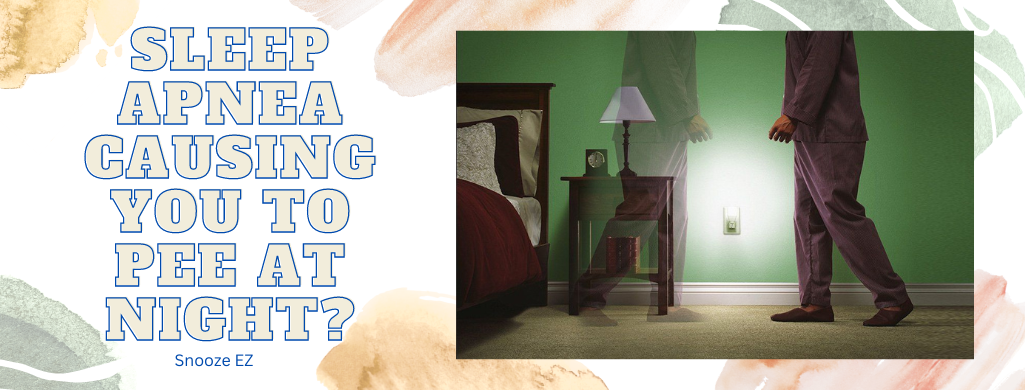Yes, frequent nighttime urination is a symptom of sleep apnea.
Could sleep apnea be causing those long nights of frequent bathroom trips?
Many people with this condition also experience nocturia – a condition where they feel the urge to pee multiple times during the night even though they don’t drink any fluids before bed yet still have difficulty maintaining bladder control throughout the night.
We’ll explore whether sleep apnea can make you pee at night and what other signs may indicate this condition.
Does sleep apnea make you pee at night?
Sleep apnea is a serious condition that can cause numerous health issues, including frequent nighttime urination.
Studies have shown that most people who experience frequent trips to the bathroom at night or have overactive bladders during the day are actually suffering from sleep apnea.
A recent study has confirmed these findings and has even gone as far as to suggest that the presence of frequent trips to the bathroom is just as sensitive in predicting obstructive sleep apnea as snoring.
What does ADH do?
When we are asleep, our bodies naturally suppress certain bodily functions in order to rest.
One of these is kidney function, which produces less urine due to lower blood circulation and less need for filtration.
To further reduce the amount of urine produced, the body increases the production of ADH (antidiuretic hormone).
This hormone communicates to the body that it needs to hold onto more water, so that the urine produced is more concentrated.
As a result, we often don’t feel the urge to urinate at night even though our bladder may be full.
What does ANP do?
However, the reason why sleep apnea can lead to more frequent trips to the bathroom is because it causes sudden shifts in blood flow into the heart after an obstructive event, which increases production of ANP (atrial natriuretic peptide).
This hormone makes your body produce more urine, so even though you may not have a completely full bladder when you wake up, you will still feel like you need to go.
Additionally, diluted levels of urine during these episodes are also predictive of having obstructive sleep apnea.
How does nocturia and sleep apnea relate?
Nocturia, or the need to urinate during the night, can have a significant impact on how well someone is sleeping.
It can be caused by a variety of factors, and it is important to discuss any nocturia symptoms with your doctor.
However, there may also be a connection between nocturia and sleep apnea.
Research has found that around 84% of sleep apnea patients also experience nocturia.
This suggests that nocturia could potentially be used as a screening tool for sleep apnea in some cases.
Additionally, it appears that treating sleep apnea can help reduce the frequency of nocturia episodes in many people.
Therefore, if you are experiencing frequent episodes of nocturia, it may be worth discussing this with your doctor to see if further testing for sleep apnea is necessary.
Does treating sleep apnea help peeing at night?
Studies have shown that treating sleep apnea can reduce the instance of nocturia and other symptoms such as GI disorders, night sweats, and even issues losing weight.
Research presented at the European Association of Urology (EAU) annual meeting in London suggests that treating sleep apnea with CPAP machine therapy may help ease the need to get up frequently to urinate.
This is the first study to show the true incidence of nocturia, or peeing at night, in patients who suffer from obstructive sleep apnea and also the size of the effect of positive pressure mask treatment on their nocturia symptoms.
Lead researcher Sajjad Rahnama’i from Maastricht University Medical Center in the Netherlands stated that many men’s urinary habits benefit when CPAP mask therapy is used.
One U.S. apnea expert who reviewed the findings said that apnea and nighttime overactive bladder often go together, making it important for those suffering from both conditions to seek treatment for both issues simultaneously.
Dr. Steven Park says “I often see complete or near total resolution of these sort of problems after definitive sleep apnea treatment.”
Therefore, treating the underlying cause of sleep apnea can help resolve nocturia and improve overall health and well-being.
Conclusion
Sleep apnea can cause all sorts of issues, including peeing frequently at night.
It is important to note that nocturia can also be caused by other medical conditions, such as diabetes, kidney disease, and bladder infections.
Additionally, lifestyle changes such as reducing caffeine intake and avoiding alcohol before bedtime can help reduce the frequency of nocturia.
Though, no matter, if you are constantly getting up more than 2 times a night to urinate, then you need to see your doctor to discuss the possibility of sleep apnea and other underlying medical conditions.


